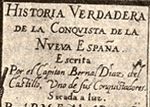Bernal
Díaz del Castillo (1492-1580)
1492 Born
in Medina del Campo,
1514 Bernal
Díaz went to the
1515 He
moved to
1517 Under
the leadership of Francisco Hernández de Córdoba, Bernal Díaz went on a
discovery and conquest trip to Yucatán.
1518 Bernal
Díaz joined the expedition of Juan de Grijalva as a common soldier that went
along the coast of
1519 - 1521 Bernal Díaz accompanied Cortés' entire expedition to
1521 - 1535 Instead of settling an what might have been a lucrative encomienda, Bernal Díaz went in search of gold with these conquistadors
on the following expeditions: (1) with Gonzalo de Sandoval (one of Cortés'
lieutenants) in Coatzalcoalcos; (2) with Luis Marín in Chiapas; (3) with
Rodrigo Rangel in the regions of the Zapotecas; and (4) with Cortés in
Honduras. During these expeditions he fought in 119 major battles!
1535 Bernal Díaz married Teresa
Becerra, and the couple settled in
1540 He
returned to
1550 Again
he returned to
1552 He
read the official published chronicle of Cortés' exploits and deeds, Crónica de la conquista de Nueva España
(Chronicle of the Conquest of New Spain) by Francisco López de Gómara
(1511-1566; known as Gómara), who was a Spanish historian and priest. His most
famous work is this chronicle. Although he never went to the New World and he
never took part in any expeditions, he did have direct access to Cortés and
other conquistadors during their return visits to
1568 Bernal
Díaz finishes his work: Historia
verdadera de la conquista de la Nueva España. This work did not appear in print until 1632. The title in English is True History of the Conquest of New Spain.
Bernal Díaz demonstrates a monumentally accurate memory, although there are a
few mistakes in this lengthy work. It is remarkable for its realism, common
sense, clear, readable style, and defense of regular soldiers and their difficulties.
He displays a constant sense of admiratio
concerning the amazing things he saw first-hand in
To
read a key passage from this book, click on the Document button below.
1581 Bernal
Díaz dies on his encomienda in
NOTES: Bernal Díaz del Castillo is important for
Latin American humanities because he wrote one of the most significant books in
Spanish in the 16th century, the first complete century in which
printed books circulated among an increasingly well educated public. He knew
the power of published documents and books as a means to exchange information,
to engage in public discourse, to express a personal (individual) point of
view, to spread and refute knowledge, and to achieve the personal earthly fame
and glory that was attached to writers of important works. As a common soldier
with the opportunity to advance himself through his own individual effort he
represents the individualistic or democratizing undercurrent that pulsates
through Spanish and Latin American society during the Renaissance, which was
also, the period when monarchical absolutism began to assert itself so
strongly.





